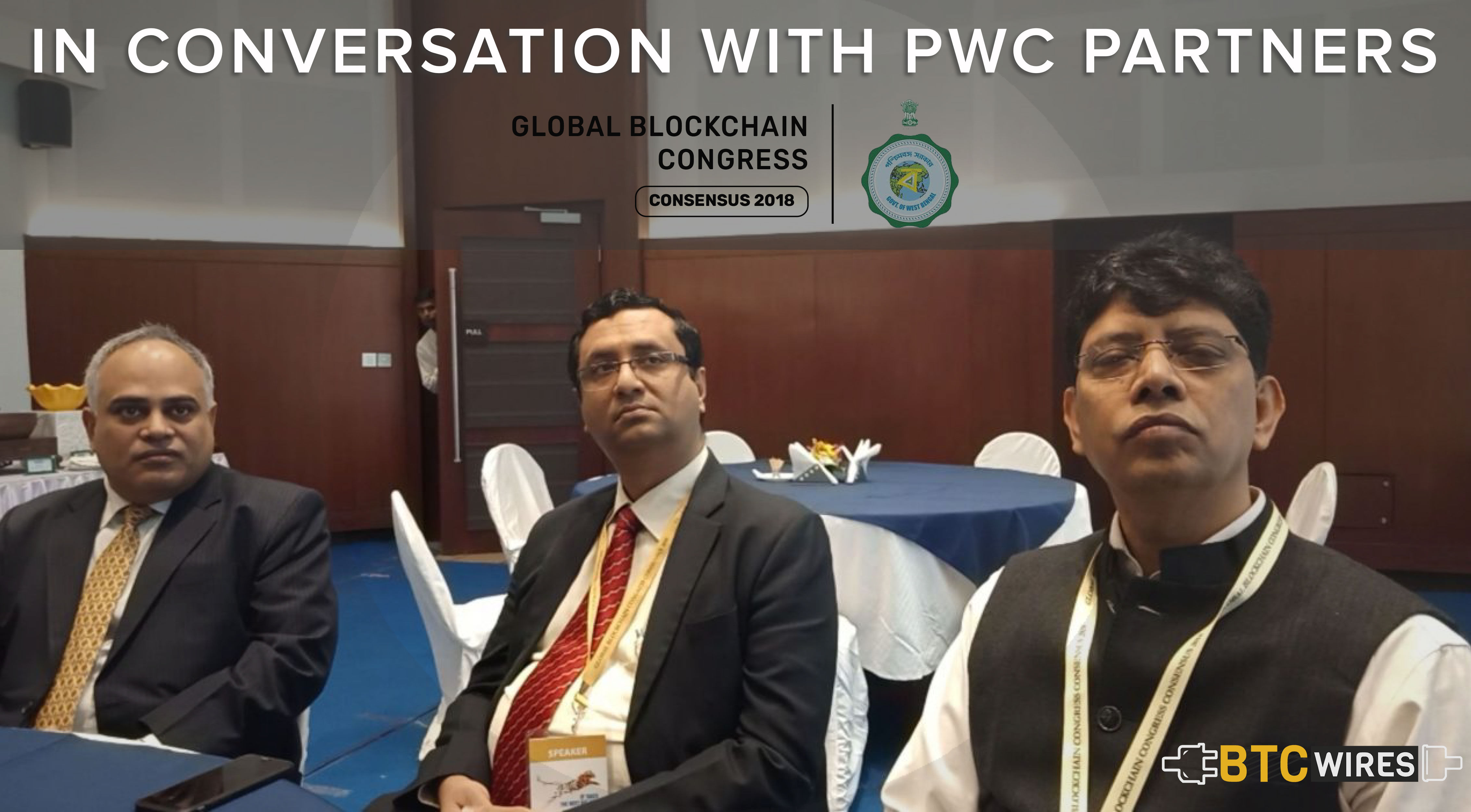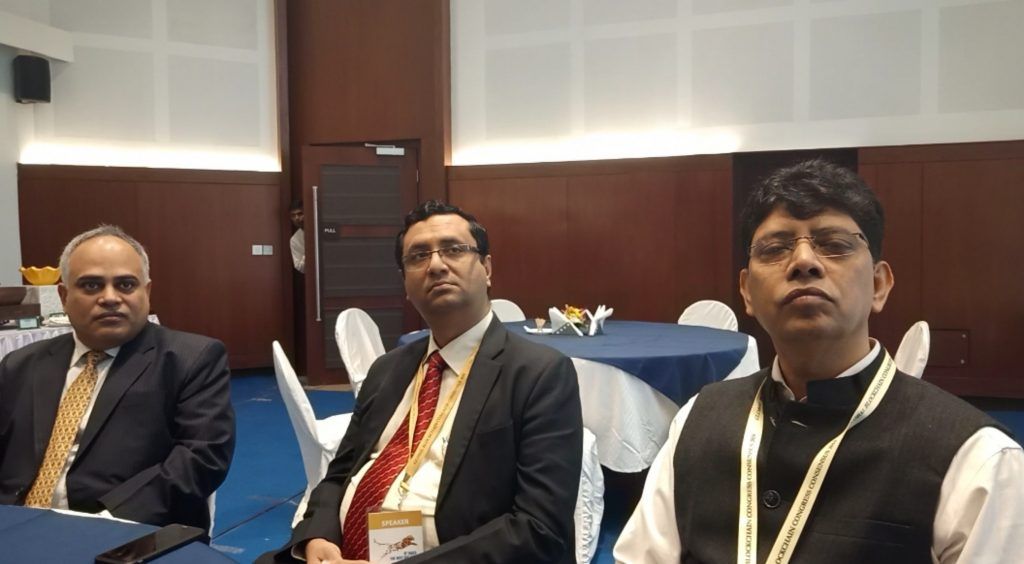West Bengal’s Global Blockchain Congress 2018 is officially a wrap!

West Bengal’s Global Blockchain Congress 2018 is officially a wrap! As the chock-full itinerary ensured a lively and enriching conference, we caught up with three officials from PricewaterhouseCoopers or PwC, the project partner for this event. Rishma Banerjee and I from BTCWIRES were able to get answers to vital questions from three of the company’s Partners. They were present to be a part of the launch of a thought leadership paper titled “Automating Trust in Citizen Services“, co-branded by their company and Webel.
The officials interviewed were Mr. Arijit Chakraborty– Partner, Advisory; Mr. Amulya Patnaik– Partner, Advisory and Mr.Sreeram Anathasayanam– Partner, Government and Public Services, who delivered an engaging talk on “Making Blockchain Real” in a Day 1 session. Following is a brief transcript of the interview.

BTCWIRES:
Based on the fact that this is the one of the first brushes of West Bengal with blockchain’s global community, do you see West Bengal developing as a “blockchain hub” in the coming days, perhaps in the long run?
Mr. Patnaik took this question, saying:
Over the past year, the amount of enthusiasm we have seen on the part of the State Government fills us with hope for future development. Talks about having a “Centre of Excellence for Blockchain” have been on the table. The way this event was taken up by the government testifies to the immense commitment they have towards the adoption of new technologies. Such a forward approach towards blockchain technology, taken up by the State Government of West Bengal is nothing short of a unique distinction.
BTCWIRES:
We are well aware of the multiplicity of use cases that exist when it comes to blockchain technology.
Which out of those use cases are the most relevant in the Indian scenario?
Mr. Anathasayanam took this question, saying:
“There are three broad areas of use cases. The first one is registry- it can be for land ownership, birth, death or even corporate usage. This is an area that has multiple intermediaries who typically do not add much value and hence can be eliminated by the adequate implementation of blockchain technology.
He continued into his second point:
The second area involves blockchain in supply chain management, in areas as diverse as excise and transfer of benefits in kind.
He elaborated on his third and final point, saying:
The third area which is becoming increasingly important is the one about licensing and verification: be it for setting up new businesses or issuing permits. A recent PwC-FICCI publication deals exclusively with use cases that may be implemented in cities and governance, and lists around 100 odd use cases that one should definitely take note of.
You May Also Read- Blockchain Use Case: Digital Identity
BTCWIRES:
Over the course of Day 1 sessions, several speakers spoke about the importance of having blockchain-oriented curriculum in our colleges and universities.
Do you believe there can be a Public-Private–Partnership model that can help make such suggestions a reality?
Mr. Arijit Chakraborti answered this question, saying:
There is a lot of scope indeed. It is not enough to talk about blockchain as an isolated technology. Instead, we need to explore ways to automate the building of trust in the society. This requires the integration of other tech elements such as IoT (Internet of Things) and AI (Artificial Intelligence).
Speaking of past attempts to spread bblockchain-related education, he added:
One of the main parties that took the lead for organising the event, Webel, has earlier held programmes, workshops and sessions about IoT, quantum computing etc. with the ultimate goal of spreading awareness. In these events, speakers have represented fields as diverse as academics and government services, sowing the seeds for developing a curriculum in the future.
BTCWIRES:
Although much is written about blockchain’s role in helping the poorest sections of the society, we mostly see the technology restricted to urban, technologically advanced locales.
In a country like India, where a large chunk of the population is rural, do you see a viable way of reconciling blockchain’s benefits with the needs of the traditional market economies?
Mr. Chakraborti took this question as well, and said:
Given it’s a heavily populated country we are talking about, blockchain can aid greatly in issuing registration certificates for birth, death and identity. Although we’ve begun working with Kolkata’s New Town area now, we do hope that these benefits will soon go beyond the city limits and help the rural populace store records and certificates safely and verifiably.
Mr. Anathasayanam added some crucial points, saying
There are some specific areas of use cases when it comes to blockchain in rural areas. For example, when we talk about a programme as important as the PM Fasal Bima Yojana, blockchain can play a huge role in facilitating its adequate implementation. Secondly, if direct benefit transfers are to be made, blockchain and allied tech elements can make the verification of economic criteria possible. What Mr. Chakraborti said about identification, will add on to these mechanisms, leading to very clear use cases.
You May Also Read- Blockchain Use Case:Payments
Mr. Amulya Patnaik added on
Blockchain technology can basically infuse governance with the elements of transparency, agility and conformity. We are very excited about the prospect of using blockchain technology to overcome the existing trust deficit.
You May Also Read-
Blockchain Use Case: Governance
Blockchain use Case: Law Enforcement
The conversation with these three Partners gave us a valuable insight into how PwC sees blockchain developing in India. Given the country has several untapped areas left to explore, we are sure specific blockchain use cases
